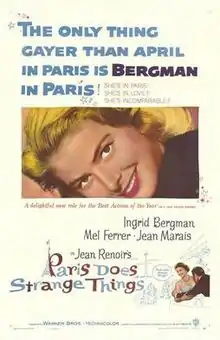Elena and Her Men
Elena and Her Men is a 1956 film directed by Jean Renoir and starring Ingrid Bergman and Jean Marais. The film's original French title was Elena et les Hommes, and in English-speaking countries, the title was Paris Does Strange Things. It is the third addition to the trilogy, preceded by The Golden Coach (1953) and French Cancan (1955).[2] A restored copy has been released in the 21st century.
| Elena and Her Men | |
|---|---|
 Theatrical release poster | |
| Directed by | Jean Renoir |
| Produced by | Louis Wipf |
| Written by | Jean Serge Jean Renoir |
| Starring | Ingrid Bergman Jean Marais Mel Ferrer Jean Richard |
| Music by | Joseph Kosma |
| Cinematography | Claude Renoir |
| Edited by | Borys Lewin |
| Distributed by | Warner Bros. Pictures |
Release date | 12 September 1956 (France) 31 December 1956 (Italy) 29 March 1957 (U.S.) 28 November 1958 (Germany) |
Running time | 95 minutes |
| Country | Italy/France |
| Language | French |
| Box office | 2,116,337 admissions (France)[1] |
Plot
Produced in 1956, and set in 1890 France, Elena and Her Men tells the story of a young, beautiful, and free-spirited Polish princess in fin de siècle Paris who specializes in granting people good luck. Elena's family has run out of money, and in order to save them, she agrees to marry a wealthy, older family friend. No sooner has she agreed to this engagement, then she meets a handsome stranger during a 14 July celebration, who turns out to be the famous General Rollan's aide, Count de Chevincourt (Mel Ferrer). Sparks fly with the Count, but when he introduces Elena to General Rollan (Jean Marais), the General is quite taken with her as well. By the end of the day, Elena finds her hands full with her engagement and the romantic interests of two new men. To further complicate matters, General Rollan's political advisers see the General's romantic interest in Elena as a way to influence him to take over the French government, and they employ her to grant him the luck he needs to do so.
As the movie progresses, a comical battle of juggling responsibilities develops in each character. Elena feels it is her moral duty to honor her engagement, and to help the General save France, but in her heart she loves the Count. The Count is loyal to his general and country, but is unwilling to concede Elena to the General. The General is in love with Elena but already has a mistress and is preoccupied with his growing political role in France.
When the General is deliberately posted to a remote town by the French government to prevent a coup d'état, Elena follows, trying to help save France. The Count pursues her, trying to win Elena's heart. The film concludes with Elena and the Count kissing in a brothel window, impersonating Elena and the General, providing a decoy so that the General and his mistress are able to escape France disguised as gypsies. The General abandons his political obligations and Elena, and the show of affection between Elena and the fake General sparks their love for each other touching the hearts of the people watching, and causing a wave of true love to pass over the town and mend political tension.
Cast
|
|
|
Background
This was Bergman's first film after leaving her husband, director Roberto Rossellini. The character of General Rollan was based on the historic General Boulanger. In 1886, Boulanger had much popular support personally despite the French defeat in the Franco-Prussian War, and some supporters urged him to conduct a coup d'état. (He did not.)
Reception
Ingrid Bergman's performance was highly praised. Roger Ebert wrote that she played a Polish princess who could affect the future of France, but he said, that's just what the plot is about.
"The movie is about something else - about Bergman's rare eroticism, and the way her face seems to have an inner light on film. Was there ever a more sensuous actress in the movies? François Truffaut, reviewing this film, observed that 'sex is the only focus of attention'."[3]
He says that "Renoir preserves a strong erotic and romantic thread (the love between Bergman and Ferrer) all the way through the movie's farcical elements."[3]
Christopher Faulkner described the film as a farce dealing with many issues and incidents similar to Renoir's well-known Rules of the Game. But he wrote that it is somewhat "cynical," despite its lightness. He says that "the point is made that a woman can only find (provisional) power within representation, on a stage, playing a part. At the end of the film, as coup d’état dissolves into coup de théâtre, the suggestion is that all effective power is actually a function of performance."[2]
References
- "Box Office Figures for Jean Marais films". Box Office Story.
- Faulkner, Christopher. "Elena and Her Men". The Criterion Collection. Retrieved 7 July 2015.
- Ebert, Roger (3 February 1987). "Reviews: Elena and Her Men". RogerEbert.com.